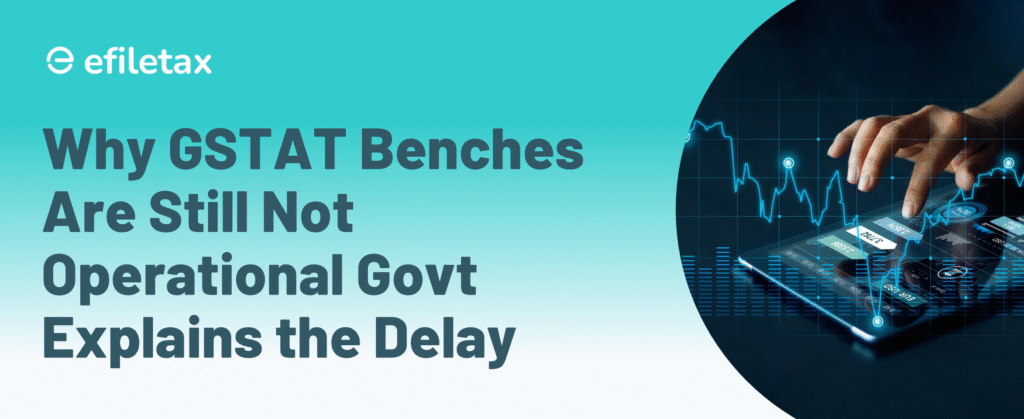
Why Is GSTAT Still Not Operational? Legal Reasons Explained
The delay in operationalising the Goods and Services Tax Appellate Tribunal (GSTAT) has frustrated many taxpayers and professionals. Though it was cleared in principle in 2023, the Ministry of Finance has recently clarified that legal and procedural hurdles are behind the delay.
In this blog, we decode those hurdles and explain what’s at stake — especially for those waiting to appeal GST orders.
What is GSTAT and Why It Matters
The GST Appellate Tribunal (GSTAT) is a quasi-judicial body set up under Section 109 to 111 of the CGST Act, 2017. It is meant to handle second appeals under GST — after orders passed by the First Appellate Authority.
Why it’s critical:
- High Court writs are expensive and time-consuming.
- GSTAT would offer faster relief to taxpayers.
- A functional GSTAT ensures a structured appellate mechanism under GST law.
GSTAT Delay: Official Explanation by Finance Ministry
In a statement to the Parliament and press, the Finance Ministry acknowledged that although legislative changes have been passed (via the Finance Act, 2023), the actual implementation is stalled.
Key challenges cited:
- Judicial Structure Concerns:
Based on Supreme Court rulings (like Madras Bar Association vs Union of India, 2021), the Centre had to restructure tribunal composition to ensure independence and maintain judicial primacy. Any misstep could invite constitutional scrutiny. - State Coordination Delays:
Since GST is a dual tax system (Centre + States), GSTAT benches require nominations from both governments. Delays in state-level nominations are slowing the process. - Infrastructure Planning:
Tribunal benches need proper courtrooms, staff, and administrative setup. Multiple states are yet to finalise infrastructure or provide suitable space. - Appointment Rules Finalisation:
Though the GSTAT (Appointment and Conditions of Service of President and Members) Rules, 2024 were notified, some states raised concerns on selection panel structure and eligibility, leading to procedural hold-ups.
GSTAT Status as of July 2025
- Finance Act, 2023: Enabled formation of Principal Bench and State Benches
- GSTAT Procedure Rules, 2025: Notified to streamline filing, registry, certified copies, etc.
- President Appointment: Awaited; no official list declared yet
- Bench Locations: Tentatively finalised in key cities (Delhi, Mumbai, Chennai, Kolkata, etc.), but operational date not announced
- Pending Cases: Lakhs of appeals stuck across India due to absence of appellate forum
Legal Angle: Why Tribunal Setup Isn’t Easy
Supreme Court Restrictions
The Supreme Court has repeatedly warned the Centre against excessive executive control over tribunals. The GSTAT structure had to be revised to comply with:
- Minimum number of judicial members
- Age and tenure requirements
- Independent appointment process
Violating these could make GSTAT appointments vulnerable to litigation.
Federal Design of GST
Under Article 279A of the Constitution, both Centre and States share power. So, even if the Centre is ready, states must consent to:
- Bench locations
- Cost-sharing
- Nominee members
This consensus mechanism, while constitutionally correct, causes real-world delays.
Expert View: What Taxpayers Should Do Until GSTAT Becomes Functional
“In the absence of GSTAT, the only remedy is to file a writ petition in the High Court. But not every case justifies that expense. Many taxpayers are left with no viable appeal option today.”
— CA Rakesh Patel, Indirect Tax Consultant
Practical tip: File your first appeal carefully under Section 107 CGST Act. Since no second appeal is possible currently, make sure all documents and arguments are strongly put up before the First Appellate Authority.
What Happens After GSTAT Is Set Up?
Once operational:
- Taxpayers can appeal against FAA orders within 3 months (Section 112, CGST Act)
- Principal Bench will handle cases involving place of supply disputes
- State Benches will handle regular GST appeals
- Certified copy timelines and online filing systems will be introduced as per GSTAT Procedure Rules, 2025
Summary
GSTAT delay stems from legal and procedural issues — including Supreme Court rulings, state coordination, and infrastructure gaps. Ministry of Finance confirms implementation is in process but slowed due to federal structure and tribunal independence concerns.
FAQs on GSTAT Delay
Q1: Is GSTAT currently functional?
No, as of July 2025, no GSTAT bench is operational.
Q2: Can I appeal a GST order without GSTAT?
Only through a writ petition in High Court, which is costly and not practical for most.
Q3: What’s the legal basis for GSTAT?
Sections 109–111 of CGST Act, supported by Finance Act 2023 and Tribunal Rules 2025.
Q4: When will GSTAT likely be operational?
No official date. Depends on Centre–State coordination and judicial appointments.
Final Take: Don’t Wait, File Smart
Until GSTAT goes live, the only practical solution is to be extra cautious during the first appeal. Draft well, attach all evidence, and stick to timelines.
Need help with GST appeals or first-level disputes?
Get expert help with Efiletax. Our team handles notices, filings, and appeals professionally.